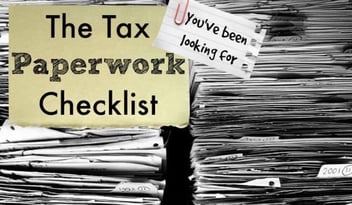 Article highlights:
Article highlights:
- It's time to collect your information for the tax appointment.
- Choosing the options
- Real estate sales and depreciation
- Where to Begin?
- Accuracy, even for details.
- Change in marital status and dependents.
- Certain transactions need special treatment.
- Options for reinvesting dividends include selling stock or other property, gifting or inheriting property.
- Home Sales, Purchases, and Energy Expenditures
- Identity Theft.
- Car Expenses
- Charitable donations
You, like most taxpayers, certainly hate the process of gathering your documents for your tax preparation session, but the work is generally worthwhile in terms of additional tax savings! When you come properly prepared for your appointment, you will have extra time to:
- Consider all allowed deductions
- Determine the most appropriate income reporting and deductions for your case
- Stay up-to-date on tax law changes.
- Discuss tax-planning strategies that might lower your future tax obligation.
Choosing Your Best Alternatives
The tax law provides you a range of approaches to processing income and deductions on your return. Choices made while preparing your return often have an impact on both the current year and future returns. These selections pertain to the following topics:
Property sale
For the year in which you sell property and arrange for payments on the sales contract to be made over a period of years, you may be able to choose between reporting the entire gain on the return for the sale year or over several years as payments from the buyer arrive.
Depreciation
When you buy commercial property, the cost is typically written off (depreciated) over many years, but in rare situations, the cost might be deducted entirely at once.
Where to Begin?
Preparation for your tax appointment should start in January. Set up a secure storage facility immediately after the New Year, such as a file drawer, cabinet, or safe. When you get relevant documents, such as W-2 forms and 1099s reflecting interest, dividends, or other income, file them straight away so you don't forget or lose them. Make this a habit, and you'll find your task much simpler on your appointment day.Other basic tips for preparing for your visit include:
Separate your data into revenue and spending categories. Medical expenditure receipts should be filed in one envelope or folder, mortgage interest payments in another, charity contributions in a third, and so on. If you are given an organizer or questionnaire to complete before to your visit, fill out each area that relates to you. (Important: Read all explanations and directions carefully. Organizers are designed to remind you of transactions that you may otherwise overlook.
Pay special attention to any overseas bank account, foreign financial account, or foreign trust in which you have an ownership interest, signing authority, or control stake. We also need to understand overseas inheritances and ownership of foreign assets. In brief, please bring any international financial transactions to our notice so that we can determine whether you have any extra reporting needs. Failure to prepare and submit mandatory reports might result in severe fines.
If you obtained your health insurance via a federal Marketplace, you will get Form 1095-A from the Marketplace, which will include the information you need to complete your return.
Keep yearly income statements separate from other papers. Make sure to bring these paperwork to your visit, especially the K-1 instructions!
Make a list of questions to remember to ask during the appointment. Examine last year's return. Compare your revenue from previous return to your income this year. A dividend from ABC stock on your prior-year tax return may remind you that you sold ABC this year and need to disclose the transaction, or that you have yet to get the current year's 1099-DIV form.
Make sure you have the social security numbers for all of your dependents. The IRS closely examines these and may disallow deductions and credits for returns submitted without them.
Compare previous year's deductions to your current records. Did you forget something?
Collect any more documents or financial paperwork that you are unsure about. Prepare to bring them to your visit so you may inquire about them.
Accuracy Even in Details
Review personal data to guarantee the highest level of correctness in all details on your return. Check the name(s), address(es), social security number(s), and occupation(s) on last year's tax returns. Note any changes for this year. Although your phone number and e-mail address are not necessary on your return, they are usually useful if concerns arise throughout the return process.
Marital Status Change
If your marital status changed during the year, you lived away from your spouse, or your spouse died during the year, please describe the dates and details. If you have prenuptial, legal separation, divorce, or property settlement agreements, bring them with you to your meeting. If your spouse died this year, you should have a copy of his or her trust agreement or will ready for perusal.
Dependents
If you have qualified dependents, you must give the following information for each (if you already supplied us with items 1-3, you do not need to provide them again):
1. Your first and last name.
2. Social Security number.
3. Birthdate
4. The number of months you've lived in your house.
5. Their total income (taxable and non-taxable). If your dependant is a kid over the age of 18, keep track of how long the youngster was enrolled full-time throughout the school year.
Anyone other than your kid must satisfy five rigorous dependence tests before they can be considered your dependant. If you believe one or more additional people qualify as your dependents (but are unsure), compare the amounts you contributed for their support to the amounts they and others supplied. This will make the final choice easier to make.
Some Transactions Need Special Treatment -Certain transactions need particular reporting on your tax return. It's a good idea to put a little more planning work when you've had the following transactions:
Sales of Stock or Other Property: All sales of stocks, bonds, securities, real estate, and other property must be declared on your return, even if you made no profit or loss. Most brokers will offer a complete summary of transactions for the year, together with the Forms 1099-INT and 1099-DIV they issue. If the sale is not included on the broker's report, list it and have the buy and sell documentation handy for each transaction.
Your return must include the purchase and sale dates, as well as the cost and selling price. Make sure this information is included in the papers you bring to your visit.
Don't forget to include information and documentation on digital asset transactions, including non-fungible tokens (NFTs) and virtual currencies like cryptocurrencies and stable coins. This includes (not an exhaustive list) if you:
- Received digital assets as payment for property sold or services rendered;
- Received digital assets as a prize or award.
- Sold or swapped digital assets for more digital assets.
Gifted or inherited property
If you sell property that was given to you, you must identify when and how much the prior owner paid for it. If you want to sell property you inherited, you must know the original owner's death date and the property's worth at the time. You may be able to locate information on estate tax filings or probate paperwork; otherwise, contact the executor.
Reinvested dividends
You may have sold shares or mutual funds in which you had a dividend reinvestment plan. If the firm or fund has not recorded this information and given you with the specifics, you must keep records of each stock purchase made with the reinvested dividends.
property sale gains are subject to specific tax advantages, and you may be able to exclude up to $500,000 of the gain from your principal property if you file a married joint return and fulfill certain ownership, occupation, and holding time conditions. Others are subject to a maximum exclusion of $250,000. It is a good idea to keep track of the costs of any home renovations you make since they may be used to offset any gains. The exclusion of gain only applies to principal residences, therefore keeping track of improvements to other properties, like as your second house, is critical. Remember to include a copy of the selling documentation (typically the closing escrow statement).
If you have acquired a property, bring a copy of the final closing escrow statement.
Vehicle Purchase
If you bought a new or used plug-in electric vehicle or fuel-cell car (or automobiles) this year, you may be eligible for a special credit. Please bring the purchase statement and a paper copy of the seller's report that the dealer was supposed to provide you. If you transferred the credit to the dealer when you acquired the car, you must disclose and reconcile the transaction on your return for the purchase year.
Home Energy-Related Expenditures
If you built a solar-electric system on your primary or secondary residence, or made other energy-saving modifications to your home(s), please bring the purchase information and manufacturer's credit qualifying certification to your appointment. You may be eligible for a considerable energy-related tax credit.
Identity theft is common and may affect your tax returns. If you have cause to think that your identity has been stolen, please contact this business immediately. If your identity has been stolen, you may file with the IRS using specific procedures.
Car expenditures
If you have utilized one or more vehicles for business purposes, enter the expenditures for each individually. When claiming a tax deduction for business use of your vehicle, the IRS requires you to record your total mileage, business miles, and commuting miles for each commercial usage of your vehicle on your return. So be prepared to have those figures handy. If you were reimbursed for mileage through an employer, make sure the amount is included in your W-2. For charitable donations, you must provide a bank record or written communication from the charity with the name, date, and amount.
Unreceived financial contributions placed in a "Christmas kettle," church collection plate, etc. are not deductible. Clothing and household donations must typically be in excellent or superior condition, and things like underwear and socks are not deductible. You must maintain a record of each item donated, including the name and address of the charity, the date and place of the gift, and a fair description of the property. A receipt is not required for contributions worth under $250 that are dropped off at an unattended location. For donations more than $500, the record must additionally detail the date and method of acquisition, as well as your cost basis in the property. For gifts more than $5,000 and other forms of contributions, please contact this office for further details.
Please contact our office if you have any issues regarding compiling your tax data before your visit.



